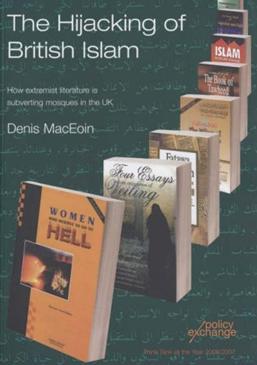Mr Justice Eady has a reputation as one of the worst blights on freedom of speech in the UK, with appalling judgements in libel cases that have led Lord Hoffman to denounce him as “hostile” to responsible journalism in the public interest. Most notoriously, he has ruled that it is libellous to describe chiropractors as “bogus”, and Tom Bower’s attempts to defend a libel action brought by the disgusting Richard Desmond were severely hampered by Eady’s insistence that vital evidence should be excluded from the case.
However, his rulings are not uniformly objectionable; he once threw out a case brought by the BNP against Searchlight, and he has now rejected a case brought by the North London Central Mosque against Policy Exchange. The Spittoon carries a quote:
“The Trustees of Policy Exchange are delighted to report that Mr Justice Eady yesterday struck out the claim brought against us by the North London Central Mosque.
North London Central Mosque commenced an action against Policy Exchange and Dr Denis MacEoin for libel, following publication of our study “The Hijacking of British Islam” in October 2007.
Six trustees who had advanced the claim on behalf of the North London Central Mosque were ordered to pay Policy Exchange’s costs of defending this action.
The High Court made a further Order that £75,000 of those costs be paid by North London Central Mosque within 28 days.”
I’ve blogged on this report, which details extremist literature available at a minority of mosques and Muslim bookshops, in the past; I noted that it was temperate in tone and that its central point was uncontroversial. This point was, as Policy Exchange put it, that
…it is clear that the influence of Saudi Arabia is both powerful and malign. Much of the material featured here is connected in some way with the Saudi Kingdom – whether by virtue of being written by members of the Wahhabite religious establishment; being published and distributed by official, or semi-official Saudi institutions; or being found in Saudi-funded, or linked, mosques and schools in this country. For this reason, the report argues, there needs now to be a proper audit of the costs and benefits of the Saudi-UK relationship.
The report also gave a number of mosques a clean bill of health, which is inconsistent with an anti-Muslim bias. I thought the report could have been more nuanced – just because a bookshop has a dodgy text available it does not mean that the text is therefore being promoted – but clearly there is a problem.
The main problem was that the author, Denis MacEoin, was let down by his collaborators. In December 2007, BBC Newsnight showed that receipts used to prove that certain texts could be bought from certain bookshops had been forged. Rather than investigating this discovery, Policy Exchange’s Dean Godson instead gave a blustering performance on the show and promised to sue for libel: in his words, action would be pursued “to trial or capitulation”. However, no trial or capitulation were forthcoming. Dominic Wightman, who collaborated with MacEoin on another report, for Civitas (as “Dominic Whiteman”), suggested to me some months ago that the anonymous researchers sent to the sites to purchase the books had made the forgeries in order to inflate their expenses, which seems a reasonable explanation (despite my problems with Wightman on other matters). Private Eye got to the heart of the matter in February (1203 p. 8) by pointing out that there was no need to rely on the receipts anyway: the presence of certain texts could be verified independently, and in some cases their vendors were quite happy to admit to selling them. Had Godson responded to Newsnight more in this vein than in duff libel threats of his own, the North London Central Mosque might perhaps have been more wary about chancing its arm at the High Court.
UPDATE: Unity adds, at Liberal Conspiracy:
The upshot of all this seems to be that the allegation that extremist literature was being distributed from the North London Central Mosque, or from a bookshop associated with it, does not rest solely on the evidence provided by the forged receipts exposed by Newsnight, but can be readily verified by other means.
This does not, however, appear to have been the case in regards to Al-Manaar Muslim Cultural Heritage Centre, hence the apology and the decision to withdraw the report.
Despite efforts to spin the NLCM case as a clear win for Policy Exchange, it remains the case that:
a) it did have to withdraw the report due to it containing false allegations relating to the Al-Manaar Muslim Cultural Heritage Centre,
b) it did have to issue the Al-Manaar Muslim Cultural Heritage an unequivocal and rather humiliating apology, and
c) the report did make use of fabricated evidence, albeit that it does appear that in the case of the North London Central Mosque, the faked receipts were not needed to sustain the allegations against it.
Filed under: Uncategorized




[…] evidence in his report. In lieu of such a full account, Richard Bartholomew has posted what may be the most credible account of the circumstances in which fake receipts found their way into Policy Exchange’s report: […]
[…] must confess that I assumed the case had been thrown out because Policy Exchange had produced some new valid evidence. […]